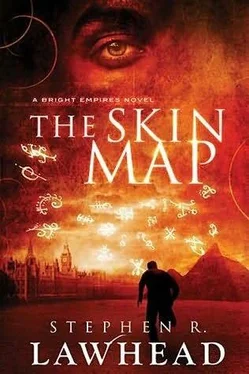Stephen Lawhead - The Skin Map
Здесь есть возможность читать онлайн «Stephen Lawhead - The Skin Map» весь текст электронной книги совершенно бесплатно (целиком полную версию без сокращений). В некоторых случаях можно слушать аудио, скачать через торрент в формате fb2 и присутствует краткое содержание. Жанр: Фэнтези, на английском языке. Описание произведения, (предисловие) а так же отзывы посетителей доступны на портале библиотеки ЛибКат.
- Название:The Skin Map
- Автор:
- Жанр:
- Год:неизвестен
- ISBN:нет данных
- Рейтинг книги:4 / 5. Голосов: 1
-
Избранное:Добавить в избранное
- Отзывы:
-
Ваша оценка:
- 80
- 1
- 2
- 3
- 4
- 5
The Skin Map: краткое содержание, описание и аннотация
Предлагаем к чтению аннотацию, описание, краткое содержание или предисловие (зависит от того, что написал сам автор книги «The Skin Map»). Если вы не нашли необходимую информацию о книге — напишите в комментариях, мы постараемся отыскать её.
The Skin Map — читать онлайн бесплатно полную книгу (весь текст) целиком
Ниже представлен текст книги, разбитый по страницам. Система сохранения места последней прочитанной страницы, позволяет с удобством читать онлайн бесплатно книгу «The Skin Map», без необходимости каждый раз заново искать на чём Вы остановились. Поставьте закладку, и сможете в любой момент перейти на страницу, на которой закончили чтение.
Интервал:
Закладка:
“Don’t worry. I’ll stay right here.”
But he was already gone, disappearing into the wheeling, swirling traffic of the square. Mina sat in the wagon and continued soaking in the sights and sounds around her, trying to gain some measure of the place. Prague, she thought, in the thirtieth year of Emperor Rudolf the Second-is that what Etzel had said? What did she know about the seventeenth century? Not much. Nothing, really. Didn’t Shakespeare live in the 1600s? Or was it Queen Elizabeth? She couldn’t remember.
If she had ever once in her life given the realities of life in seventeenth-century Bohemia a fleeting thought-and she most certainly had not-she would have pictured a world of superstition and suffering where obscenely rich and powerful aristocrats oppressed the miserable mass of grimy peasants whose lives were nasty, brutish, and short. Yet the folk she observed bustling around her, while admittedly grimy and short, seemed a fairly happy lot-judging solely from the air of amiable bonhomie permeating the Old Town square. Everywhere she looked, people were smiling, laughing, greeting one another with formal handshakes and kisses. Uniformly dressed in dull browns and drab greens-long knee-length cloaks and breeches for men, and short bodices with long, full skirts for the women-they nevertheless seemed prosperous enough.
It was the ladies who caught her attention, and from what she could see from her seat in the wagon, long hair was definitely in fashion-piled high and extravagantly curled or braided. Nearly everyone wore some sort of head covering; a scant handful of women covered their elaborate locks with fine, lace-trimmed hats; simple linen caps were in abundance, as were scarves. While their skirts might have been plain, their shawls were not; whether fringed, tasselled, square-cut, rounded, fine-woven, or knitted-all were as vivid and bright as possible: crimsons, yellows, blues, and greens, in any and all combinations. In fact, both men and women wore shawls. And children, of which there were many, were dressed exactly as their elders: adults in miniature.
The market crowd occupied her complete attention so that when the great clock in the city hall tower struck for the second time since her arrival in the square, she stirred and realized sitting so long in the wagon had made her cold. She rubbed her arms and blew into her cupped hands. Where had Etzel got to?
As if in answer to her thought, she heard a piping call and turned to see her companion, his arms laden with cloth-wrapped packages, bowling toward her through the throng, a small tribe of ragged foundlings around him. “Wilhelmina!” he called as he came to the wagon. “Our luck is good!”
He began handing up packages to her, which she took and stowed behind the wagon seat. The children were clamouring in a language Mina did not understand. What did they speak in Prague? Czech? Slovak?
“There is only one bakery on the square,” he announced, “and it is very small.” He passed her another package. “This one is for you.”
“For me?” Wilhelmina savoured an unexpected delight. “What is it?”
“Open it and see.”
She pulled one of the strings and unwrapped the parcel to reveal several small glazed cakes with chopped nuts and tiny seeds. “Honey cakes!” she cooed. “How sweet of you.”
He beamed. Taking another package, he handed it to the nearest and tallest of the ragamuffins around him. “Share with your brothers and sisters,” he instructed firmly in German, which the children seemed to understand.
The young lad opened the bag and distributed little white biscuits to his noisy comrades, who were now leaping up and down to receive their treats. The bag was soon empty, and Etzel shooed his entourage away, telling them to be good, attend Mass, obey their parents, and come back tomorrow.
“These are lecker!” exclaimed Mina, dusting off another of her grandmother’s words. She held out one of the cakes to him.
“I am glad you like them,” he said, biting into the little pastry. “This is a good place,” he observed, chewing thoughtfully. “I like it here.”
“What should we do now?” Mina wondered.
“We will start looking for a place to have my bakery.”
“Now?”
“Why not? It is a good day.”
“Very well,” she agreed. “Where do we start?”
“We begin here.”
After leaving the mules and wagon with a nearby livery service, Englebert and Wilhelmina made a thorough circuit of the square. They went shop by shop around the large open plaza that formed Prague’s busy commercial centre, and talked to many of the shopkeepers. Yes, the Old Square was the best in the city, the best in the entire region, even. And, yes, it was very expensive doing business in such a prime location. No, they did not know of any empty shops or premises on the square. “The landlord charges any price he wants for rent,” complained the butcher who worked out of a shop hardly bigger than a wagon bed. “Yet even at such high prices, these places do not stay empty long.”
The sentiment and explanation was echoed with only slight variation by everyone they approached. In the end, they were forced to conclude that even if there was a vacancy, Englebert would not be able to afford it with the limited funds he had brought from Rosenheim for the venture. “Everything is very expensive. I am beginning to think I have made a mistake in coming here,” he confessed. The thought cast a pall over his cheerful demeanour.
“How can you say that?” Mina chided. “It’s a big city, and we’ve only looked one place.”
“We’ve looked in the best place.” He sighed. “Everyone says this.”
“Maybe,” she allowed. “But there are bound to be others just as good. We just have to expand the search.”
Englebert allowed himself to be prodded into action once more, and they began scouring the interlocking network of side streets. These, they quickly discovered, were uniformly dark and narrow, and a far cry from the salubrious square. The shops and businesses were of a poorer, scrappier, even vaguely disreputable quality-as were the people frequenting these down-market establishments. The premises tended to be shoddy, the facades in need of cleaning and repair; there was rubbish everywhere; a few overly dressed ladies loitered about and, out of the corner of her eye now and then, Mina glimpsed rats.
The off-streets were depressed, to be sure, and ultimately depressing to Englebert, whose hopes dwindled with each dingy urban corridor they explored. His sighs became heavier and more frequent. Yet, these grubby backstreets did offer the one thing the more respectable and prosperous square lacked: cheap space, and plenty of it. Indeed, every third or fourth shop seemed to be either empty or going out of business; and those that weren’t gave every impression of clinging precariously to their existence.
“I have seen enough,” said the now disheartened baker. “Let us go back.”
Mina felt sorry for her dejected companion and concern over her own prospects, which were now enmeshed with his. She gave him a pat on the shoulder, and they started for the open air and sunlight of the square. Working their way back through the tangle of interwoven byways, they turned onto a street they had not searched. Halfway along, they saw that the way was blocked by a horse and wagon drawn up outside of one of the buildings. There was a man in the wagon stacking furniture and boxes into a very tipsy pyramid. Now and again, a woman appeared in the doorway with another box that she handed up to the man to be added to the unstable mound.
“I think they’re moving out,” surmised Mina.
“Who can blame them?” commiserated Englebert.
Drawing near the wagon, they paused. “Good day to you, sir. God bless you!” called Englebert, who seemed incapable of passing anyone without offering a greeting.
Читать дальшеИнтервал:
Закладка:
Похожие книги на «The Skin Map»
Представляем Вашему вниманию похожие книги на «The Skin Map» списком для выбора. Мы отобрали схожую по названию и смыслу литературу в надежде предоставить читателям больше вариантов отыскать новые, интересные, ещё непрочитанные произведения.
Обсуждение, отзывы о книге «The Skin Map» и просто собственные мнения читателей. Оставьте ваши комментарии, напишите, что Вы думаете о произведении, его смысле или главных героях. Укажите что конкретно понравилось, а что нет, и почему Вы так считаете.





